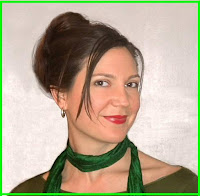
As I've mentioned previously, I'm a Sister to Sister Mentor for New Moon Girls, a fabulous magazine and online community for girls ages 8 to 12. It's really the perfect community for preteen girls- it's smart and not at all condescending, there are incredibly insightful discussions, and it allows girls to discuss issues both fun and serious in a safe environment. One of the issues on which New Moon focuses is body image, regretfully perfect for the demographic of its participants. Although I know body image barely brushes the surface of the issue, I wrote a post for the girls of the site (keep the age group in mind :)) for National Eating Disorder Awareness Week. I'm pleased to also publish it in conjunction with Body Image Warrior Week at Already Pretty, which was inspired by NEDA Week to publish posts regarding body image, and I thought that worked out conveniently. Here's the post reprinted below.
My group of friends consists of some pretty incredible girls. I suppose I am biased, as their friend, but they really are spectacular. Some of us have the highest grades in our whole class, others are being commended by colleges already for their athletics, some are leads in the school plays. But wait—that’s not really what makes us special; those are just things that society thinks make a person stand out. My friends are special because they’re caring, kind, good listeners, honest, and beautiful people.
That’s why it’s so disheartening that every one of us has known many equally special girls with eating disorders or disordered eating. A combination of genetics, cultural and family norms, low self-esteem, media influence, and dissatisfaction with weight or one’s body are causes of eating disorders. At least one in every hundred American women suffers from an eating disorder. Even more appalling, 95% of those suffering from eating disorders are between the ages of 12 and 25, and about 90% of those people female.
Eating disorders are a really important topic for me. I had very poor body image when I was younger, which is something that I still struggle with, and even contemplated eating disorder behaviors. I had really negative thoughts about my body for over a year before I told my best friend, and it was over another year later when I told my other friends. I trusted my friends, and they knew most things about me, but I was embarrassed and terrified to tell them or anyone else. My friends were all so smart and didn’t seem very concerned about their image; I thought that if I told them that I wanted to be thinner or prettier they would think I was silly or “girly”. I thought that they would be awkward around me after I told them, treating me like there was something wrong with me. I was afraid that they would agree that there WAS something wrong with me.
It also just happens that most of the people in my group of friends are especially thin. I was even afraid- amazing girls that they are who would NEVER do such a thing- that they just hadn’t noticed that I wasn’t as thin as them yet, and once I told them, they wouldn’t want to be my friends anymore.
When I told all of my friends how much I hated my body at a sleepover in ninth grade, no one freaked out. Most of the other girls admitted that they’d felt the same way, which shocked me. Most importantly, all of those girls are still my best friends, and at times that my body image was particularly negative in the future, I’ve found friends to go to that make me remember that weight isn’t important. That’s something I know for a fact- that every girl is beautiful- but sometimes I forget it about myself.
When I finally made this confession, though, something unanticipated happened- my body image improved dramatically and I was so much happier. It wasn’t because people had assured me that I wasn’t “fat”; it was because a secret that had seemed so dark and embarrassing to me really wasn’t so powerful anymore. I realized that I didn’t have to think about my weight all the time, and that people I loved most would still love me back regardless of how much I weighed.
If you are ever struggling with body image, please don’t hesitate to sticker me or one of the other mentors or post on the Sister to Sister message board. It feels so much better to get it out in the open.
Love,
Alexa




